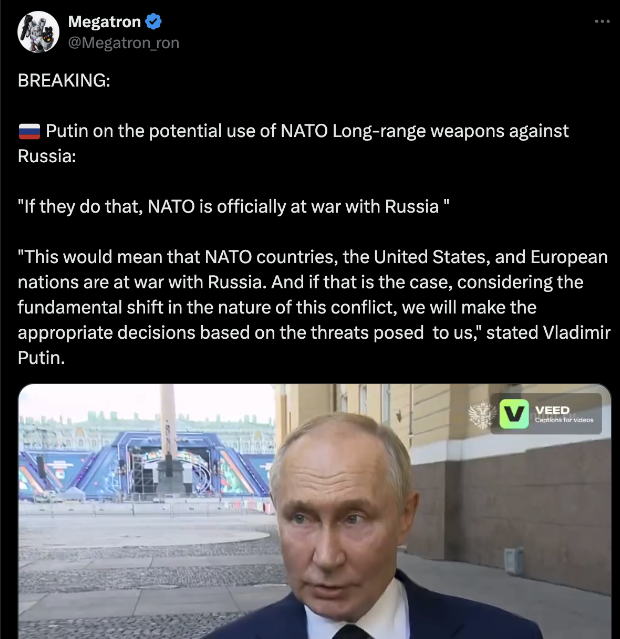A Call for Peace in Ukraine
The ongoing conflict in Ukraine presents a complex tapestry of geopolitical strategy, ethical considerations, and stark realities about the nature of modern warfare and international relations. Escalating NATO into direct conflict with Russia over Ukraine would be disastrous, as Russia’s strategic doctrine includes the potential use of nuclear weapons if faced with an existential threat, turning a regional conflict into a global catastrophe.
It’s easy to fall prey to the Western tale that Vladimir Putin is the big bad wolf of global politics. Sure, there’s a kernel of truth in there — maybe even a whole cob. But, if we’re playing the critical thinking game, we’ve got to try on Russia’s ushanka for size. Remember, they tried to buddy up with NATO, only to be left out in the cold, as Putin lamented to Tucker Carlson in what might be the most watched interview since Frost/Nixon.
Now, let’s not kid ourselves; the world’s stage is chock-full of leaders who could give Machiavelli a run for his money. They’re not all lurking in the shadows of the Kremlin or the Great Wall. The legacy media might want you to think so, but I’m not here to spill the tea on Western leaders today — tempting as that is.
The crux of the matter is this: if we’re ever going to stop playing ‘who can spill more blood,’ we’ve got to get our history glasses on. Understanding the past isn’t just for history buffs; it’s the roadmap to peace, or at least to less war. And speaking of peace, let’s not forget old Dwight D. Eisenhower’s sage advice.
“We must never let the weight of this combination endanger our liberties or democratic processes. We should take nothing for granted. Only an alert and knowledgeable citizenry can compel the proper meshing of the huge industrial and military machinery of defense with our peaceful methods and goals, so that security and liberty may prosper together.”
This geopolitical tango in Eastern Europe has thrown the global market into a jitterbug, especially the energy sector. Russia, being the gas station to Europe’s car, means this spat has left many in Europe shivering in the cold. If energy prices continue to raise it will mean more inflation, dragging the world economy down like it’s wearing cement boots.
Across the pond, the U.S. might feel like it’s watching a storm from the safety of a lighthouse, but when Uncle Sam decided to play hardball by freezing Russian assets, it was like sending out invitations for a global game of ‘Who Trusts the Dollar Now?’ This move might just encourage other nations to rethink keeping their foreign reserves as treasuries, potentially leading to some awkward economic dance-offs in the future.
On the ground, though, it’s not just about dollars and diplomacy. War scribbles its signature in blood, tears, and trauma. The Ukrainian folks, already veterans of hardship, are now drafted into an even grimmer sequel. And let’s not give the Russians a pass; they’re not exactly throwing a victory parade either. Every bomb dropped adds another chapter to the book of human suffering. It’s high time we remember that behind every strategy map, there are real people hoping to just live their lives without becoming another statistic. So, let’s push for peace talks with the same gusto we reserve for Black Friday sales, because at the end of the day, the best deal is one where everyone gets to go home safe.
Sadly, at this rate no one is going to go home safe if things are not taken down a notch. Kamala Harris might get a lot wrong, but she hit the nail on the head when she said,
“Russia is a bigger Country. Russia is a powerful Country. Russia decided to invade a smaller Country called Ukraine”.
True, but let’s not paint this as a fairy tale where NATO’s the slingshot to Ukraine’s David. Engaging in a war of attrition with Russia could resemble the world’s most agonizing game show, “Who Can Suffer Longer?” Russia’s historical resilience suggests it might endure economic and human losses far longer than Western democracies, where public sentiment for peace could quickly overshadow the appetite for prolonged conflict. Eisenhower aptly noted,
“In the councils of government, we must guard against the acquisition of unwarranted influence, whether sought or unsought, by the military-industrial complex. The potential for the disastrous rise of misplaced power exists and will persist.”
The rush towards militarization should be seen as a failure of diplomacy, where nuanced negotiation and peace-building are abandoned for force, potentially missing opportunities for peaceful resolutions. This point underlines the importance of sustained diplomatic efforts and the potential pitfalls of relying too heavily on military solutions.
An all out war with Russia will continue to divide the world into pro-NATO and anti-NATO camps, reminiscent of Cold War dynamics but in an era where economic interdependence is much higher, hindering global cooperation on critical issues. This scenario raises concerns about the potential for a new era of global polarization and the negative impact on international cooperation.
Finally, there is the China factor to consider. Recent displays, like China’s drone show in Shenzhen, hint at insane military capabilities. Imagine these drones armed; the implications are significant.
China’s advancements in drone technology and its potential to support Russia technologically and materially in a conflict scenario add another layer of complexity. NATO’s push against China, accusing it of enabling Russia’s war efforts, risks driving China and Russia closer together. This alignment would not only complicate global politics but could lead to an East vs. West confrontation, a scenario where there are no winners, only varying degrees of loss.
Good things come in threes so I’ll end with this final Eisenhower quote,
“This conjunction of an immense military establishment and a large arms industry is new in the American experience. The total influence — economic, political, even spiritual — is felt in every city, every State house, every office of the Federal government.”
So here is a call to shake off that influence. To make it clear we demand our leaders avoid war with Russia over Ukraine. This is not about ignoring Ukraine’s plight but recognizing the limits of military solutions. Instead of heading towards an escalatory spiral, the focus should be on robust diplomacy. War is a racket. It’s high time we, the people, shout ‘ENOUGH!!!’ and demand our those in charge put down the toy soldiers and pick up the phone. We’re talking about the fate of 8 billion souls here, not some playground scuffle. Let’s choose peace, because frankly, we deserve better than being pawns in some kleptocrats’ game of risk.




